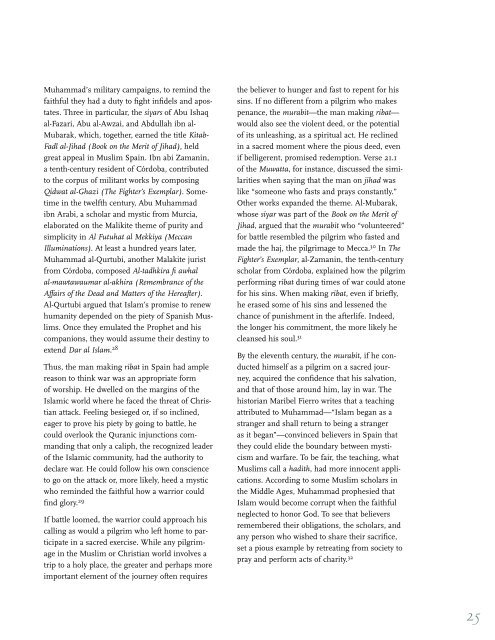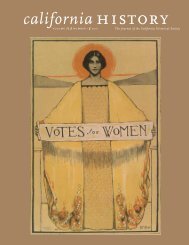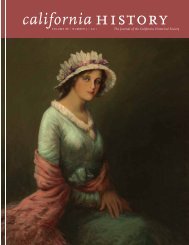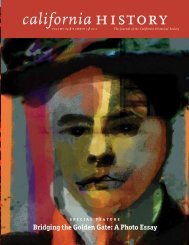Volume 90, Number 1 - California Historical Society
Volume 90, Number 1 - California Historical Society
Volume 90, Number 1 - California Historical Society
Create successful ePaper yourself
Turn your PDF publications into a flip-book with our unique Google optimized e-Paper software.
Muhammad’s military campaigns, to remind the<br />
faithful they had a duty to fight infidels and apostates.<br />
Three in particular, the siyars of Abu Ishaq<br />
al-Fazari, Abu al-Awzai, and Abdullah ibn al-<br />
Mubarak, which, together, earned the title Kitab-<br />
Fadl al-Jihad (Book on the Merit of Jihad), held<br />
great appeal in Muslim Spain. Ibn abi Zamanin,<br />
a tenth-century resident of Córdoba, contributed<br />
to the corpus of militant works by composing<br />
Qidwat al-Ghazi (The Fighter’s Exemplar). Sometime<br />
in the twelfth century, Abu Muhammad<br />
ibn Arabi, a scholar and mystic from Murcia,<br />
elaborated on the Malikite theme of purity and<br />
simplicity in Al Futuhat al Mekkiya (Meccan<br />
Illuminations). At least a hundred years later,<br />
Muhammad al-Qurtubi, another Malakite jurist<br />
from Córdoba, composed Al-tadhkira fi awhal<br />
al-mawtawaumar al-akhira (Remembrance of the<br />
Affairs of the Dead and Matters of the Hereafter).<br />
Al-Qurtubi argued that Islam’s promise to renew<br />
humanity depended on the piety of Spanish Muslims.<br />
Once they emulated the Prophet and his<br />
companions, they would assume their destiny to<br />
extend Dar al Islam. 28<br />
Thus, the man making ribat in Spain had ample<br />
reason to think war was an appropriate form<br />
of worship. He dwelled on the margins of the<br />
Islamic world where he faced the threat of Christian<br />
attack. Feeling besieged or, if so inclined,<br />
eager to prove his piety by going to battle, he<br />
could overlook the Quranic injunctions commanding<br />
that only a caliph, the recognized leader<br />
of the Islamic community, had the authority to<br />
declare war. He could follow his own conscience<br />
to go on the attack or, more likely, heed a mystic<br />
who reminded the faithful how a warrior could<br />
find glory. 29<br />
If battle loomed, the warrior could approach his<br />
calling as would a pilgrim who left home to participate<br />
in a sacred exercise. While any pilgrimage<br />
in the Muslim or Christian world involves a<br />
trip to a holy place, the greater and perhaps more<br />
important element of the journey often requires<br />
the believer to hunger and fast to repent for his<br />
sins. If no different from a pilgrim who makes<br />
penance, the murabit—the man making ribat—<br />
would also see the violent deed, or the potential<br />
of its unleashing, as a spiritual act. He reclined<br />
in a sacred moment where the pious deed, even<br />
if belligerent, promised redemption. Verse 21.1<br />
of the Muwatta, for instance, discussed the similarities<br />
when saying that the man on jihad was<br />
like “someone who fasts and prays constantly.”<br />
Other works expanded the theme. Al-Mubarak,<br />
whose siyar was part of the Book on the Merit of<br />
Jihad, argued that the murabit who “volunteered”<br />
for battle resembled the pilgrim who fasted and<br />
made the haj, the pilgrimage to Mecca. 30 In The<br />
Fighter’s Exemplar, al-Zamanin, the tenth-century<br />
scholar from Córdoba, explained how the pilgrim<br />
performing ribat during times of war could atone<br />
for his sins. When making ribat, even if briefly,<br />
he erased some of his sins and lessened the<br />
chance of punishment in the afterlife. Indeed,<br />
the longer his commitment, the more likely he<br />
cleansed his soul. 31<br />
By the eleventh century, the murabit, if he conducted<br />
himself as a pilgrim on a sacred journey,<br />
acquired the confidence that his salvation,<br />
and that of those around him, lay in war. The<br />
historian Maribel Fierro writes that a teaching<br />
attributed to Muhammad—“Islam began as a<br />
stranger and shall return to being a stranger<br />
as it began”—convinced believers in Spain that<br />
they could elide the boundary between mysticism<br />
and warfare. To be fair, the teaching, what<br />
Muslims call a hadith, had more innocent applications.<br />
According to some Muslim scholars in<br />
the Middle Ages, Muhammad prophesied that<br />
Islam would become corrupt when the faithful<br />
neglected to honor God. To see that believers<br />
remembered their obligations, the scholars, and<br />
any person who wished to share their sacrifice,<br />
set a pious example by retreating from society to<br />
pray and perform acts of charity. 32<br />
25









